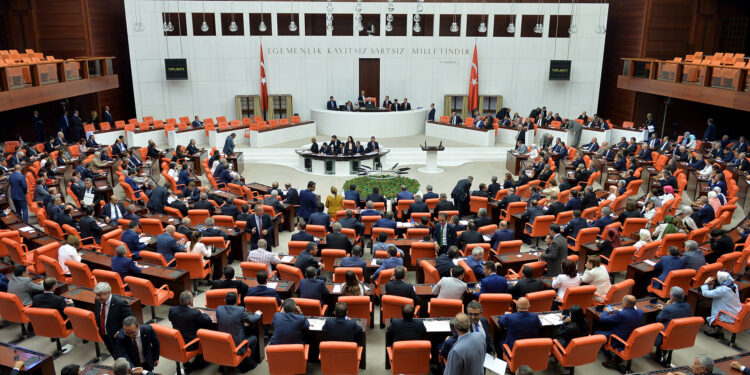Turkish lawmakers halted a parliamentary debate on a proposed tax on credit cards, which the government considers necessary to finance the arms sector and protect the country in light of the conflict in the region, according to Bloomberg.
Turks, under the pressure of high inflation, called on their banks to reduce the maximum credit limit allocated to them after the draft law on the tax was presented to Parliament on Friday.
Criticisms
In light of the criticism, the ruling Justice and Development Party announced the end of the discussions, with the possibility of reconsidering the draft law next year. The head of the Justice and Development Parliamentary Bloc, Abdullah Guler, said: “Some objections were raised from our citizens. We will study all of that in detail.”
He added: “We have postponed our discussions and will re-examine, after the budget, whether some points need to be amended or deleted.”
The legislation was proposed due to the impact of Israel’s war on Gaza and Lebanon and the exchange of bombings with Iran, events that exacerbated global fears of the possibility of a broader war breaking out in the Middle East, according to what Agence France-Presse reported.
Turkish Finance Minister Mehmet Simsek told the private NTV network: “Our country has no choice but to increase its deterrent power. There is a war in our region currently. We are in a turbulent region.”
The draft law stipulates that people whose credit card limit is at least 100,000 liras ($3,000) will have to pay an annual tax of 750 liras ($22) starting next January to support the defense sector.
Other articles in the proposed law included fees for registering new and used vehicles and additional fees when purchasing real estate, according to Bloomberg.
Developments
Simsek pointed out that “the goal of the draft law is clear… If we strengthen our deterrence force, our ability to prevent raging fires in the region will increase,” but he added that the draft law is now before Parliament and the ruling party can “reevaluate it.”
When proposing the tax on Friday, Guler stated that Türkiye would be Israel’s next target.
“At a time when we find ourselves caught up in all these geographically hot developments, we must make our defense sector stronger than ever,” Guler said.
Turkish President Recep Tayyip Erdogan, who criticized Israel’s war on Gaza and Lebanon, warned that Israeli attacks could target Türkiye soon.
Erdogan stressed – during a conference hosted by his Justice and Development Party yesterday, Tuesday – the threat posed by Israel.
While Turkey’s defense sector has boomed in recent years, Simsek noted that it needs an additional boost.
The Turkish Finance Minister stated that the sector plans to invest in a thousand projects, including an air defense system capable of protecting Türkiye from missile attacks.
He explained that this requires resources, pointing out that Turkey, a member of the North Atlantic Treaty Organization (NATO), allocated 90 billion liras ($2.63 billion) from its budget to finance the defense sector last year.
The minister said: “We raised the amount this year to 165 billion liras ($4.82 billion). We may need to double this amount.”
In 2023, Turkish defense companies signed contracts worth a total of $10.2 billion, according to the head of the Turkish Defense Industries Agency, Haluk Gurgun.
The minister pointed out that Türkiye’s ten largest arms export companies contributed about 80% of total export revenues.
Sales of Turkish Baykar drones, which were used in Nagorno-Karabakh and Ukraine, reached $1.8 billion.



